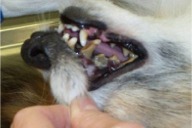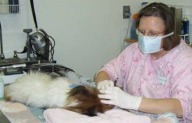This page sponsored in part
by:

This page sponsored in part
by:

Home
(email questions/comments to wrightted@aol.com).
Ted Wright -- last update 2/10/2006 (PetDentalMonth.html)
www.cvilleok.com
Copyright 2006 -- Collinsville, Oklahoma
|
Collinsville,
Oklahoma
Feb. 10, 2006 February Is National Pet Dental Health Month |
|
This web site is brought to you by
the Newspaper
Museum In Collinsville and the other advertisers appearing on these
pages. If you would like to provide content or advertisements ...
call Ted Wright (918) 371-1901 or send email to wrightted@aol.com. |
|
While your pet's "smile" is beautiful to you, a recent study indicated that 85% of dogs and cats over one year have the beginnings of periodontal disease but only 3% of dogs and 1% of cats get treatment. Periodontal disease causes more than just "dog breath." It can lead to increased risk of heart, liver and kidney disease. "Periodontal disease is currently the #1 diagnosed problem in dogs and cats over age three," said Jack O. Walther, D.V.M., President of the American Veterinary Medical Association. "Bacteria, combined with saliva and food debris between the tooth and gum, can cause plaque formulations on the tooth, which turns to tartar. If not removed from the teeth, pockets of infection may appear along the gum line, separating the teeth from the gum. If untreated periodontitis can lead to tooth loss and the infection caused by the disease may enter the bloodstream, potentially infecting major organs," Dr. Walther explained. A simple three-step program can keep your pet healthy and you smiling: Step 1: Your pet can't tell
you if he has a toothache but your veterinarian can. Begin brushing your
pet's teeth at home. It is best start them on routine brushing programs
early but adult animals can be taught to tolerate brushing. Discuss your pet's
dental care and diet with your veterinarian. "Just as the public has come to realize that their own oral health is linked to their overall health, we want them to understand that dental health care is essential to maintaining the overall health and well being of the family pet," Dr. Walther added. For more information visit www.eastsideveterinaryhospital.com
|


Press
Release